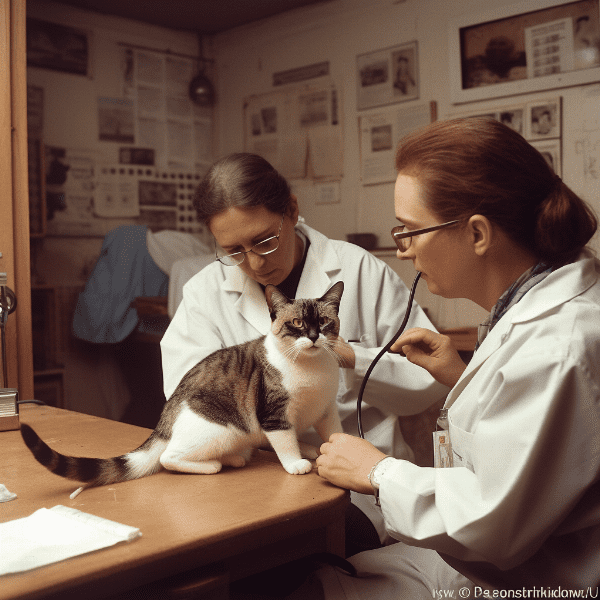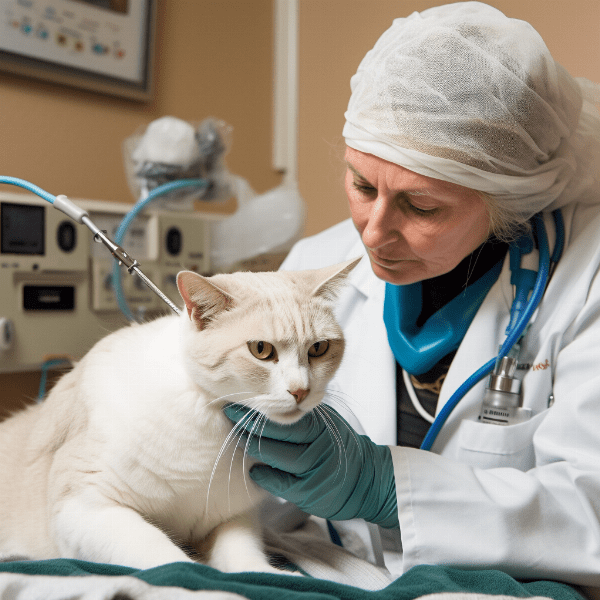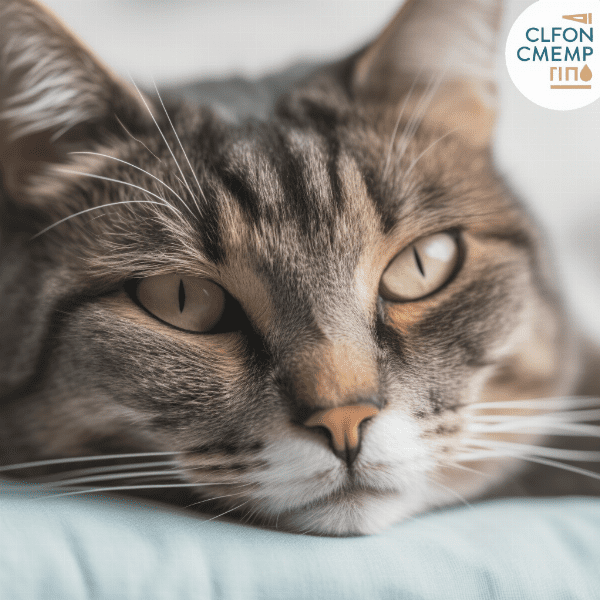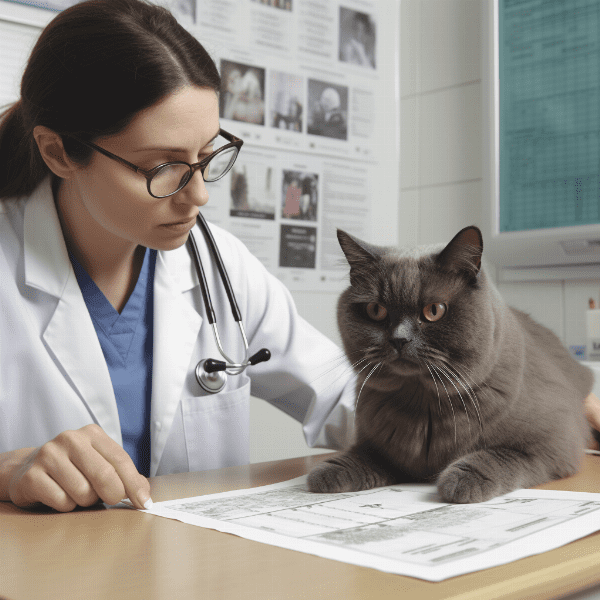Table of Contents
- Understanding Feline Cancer
- Diagnosing Feline Cancer
- Treatment Options for Feline Cancer
- The Cost of Feline Cancer Treatment
- Financial Assistance for Feline Cancer Treatment
- Creating a Budget for Feline Cancer Treatment
- Managing Feline Cancer Treatment Expenses
- Tips for Reducing Feline Cancer Treatment Costs
- Coping with the Emotional and Financial Stress of Feline Cancer
- Conclusion: Providing the Best Care for Your Feline Companion
Understanding Feline Cancer
Feline cancer is a complex disease that can affect any part of a cat’s body. It occurs when abnormal cells divide and grow uncontrollably, forming a mass or tumor. Cancer can be benign, which means it does not spread to other parts of the body, or malignant, which means it can spread to other organs and tissues.
Risk Factors for Feline Cancer
There are several factors that can increase a cat’s risk of developing cancer. Age is one of the most significant risk factors, as cancer is more common in older cats. Exposure to environmental toxins, such as cigarette smoke, pesticides, and chemicals, can also increase a cat’s risk of cancer. Additionally, certain breeds of cats are more prone to developing certain types of cancer, such as Siamese cats and lymphoma.
Symptoms of Feline Cancer
The symptoms of feline cancer can vary depending on the type of cancer and the affected area of the body. Some common signs of cancer in cats include:
- Lumps or bumps under the skin
- Abnormal swelling or growths
- Difficulty eating or swallowing
- Unexplained weight loss
- Changes in behavior or activity level
- Chronic vomiting or diarrhea
- Difficulty breathing or coughing
- Bloody discharge or bleeding from the mouth, nose, or rectum
If your cat exhibits any of these symptoms, it is important to schedule an appointment with your veterinarian right away. Early detection and treatment can improve the prognosis and increase the chances of a successful outcome.
Types of Feline Cancer
There are many different types of cancer that can affect cats, including:
- Lymphoma: a cancer of the lymphatic system
- Feline Leukemia Virus (FeLV)-Associated Cancer: a cancer caused by the feline leukemia virus
- Squamous Cell Carcinoma: a cancer that affects the skin and oral cavity
- Mammary Gland Cancer: a cancer that affects the mammary glands
- Bone Cancer: a cancer that affects the bones
Each type of cancer requires a different approach to diagnosis and treatment. Your veterinarian can help determine the best course of action for your cat.
Understanding feline cancer is an important step in providing the best care for your feline companion. By being aware of the risk factors, symptoms, and types of cancer, you can take proactive steps to detect and treat cancer early, and manage the associated expenses.

Diagnosing Feline Cancer
Diagnosing feline cancer requires a combination of diagnostic tests and physical examinations. If your cat exhibits symptoms that may indicate cancer, your veterinarian will begin with a thorough physical examination, which may include a visual inspection, palpation of the lymph nodes and other organs, and blood work.
Imaging Tests
Imaging tests are often used to detect and diagnose cancer in cats. These tests can help your veterinarian visualize the internal structures of the body and identify any abnormalities. Some common imaging tests used to diagnose feline cancer include:
- X-rays: can help identify tumors or masses in the bones, chest, or abdomen
- Ultrasound: can help identify tumors or masses in the abdomen, liver, spleen, or kidneys
- CT scan: can help identify tumors or masses in the chest, abdomen, or other organs
Biopsy
A biopsy is the most definitive way to diagnose cancer in cats. During a biopsy, a small piece of tissue is removed from the affected area and examined under a microscope to determine if cancer cells are present. Depending on the location of the tumor, a biopsy may be performed under sedation or anesthesia.
Other Diagnostic Tests
In addition to imaging tests and biopsies, your veterinarian may recommend other diagnostic tests to help diagnose feline cancer, including:
- Blood tests: can help detect abnormalities in the blood cells or liver and kidney function
- Urine tests: can help detect abnormalities in the urinary tract or kidney function
- Endoscopy: can help visualize the inside of the digestive tract and identify tumors or masses
- Fine-needle aspiration: can help determine if a mass or tumor is cancerous or noncancerous
Diagnosing feline cancer can be a complex and challenging process, but early detection is critical for successful treatment. By working with your veterinarian and following their recommendations for diagnostic testing, you can help ensure that your cat receives an accurate diagnosis and the best possible care.

Treatment Options for Feline Cancer
The treatment options for feline cancer depend on several factors, including the type of cancer, the stage of the disease, and the overall health of your cat. Treatment may involve one or a combination of the following options:
Surgery
Surgery is a common treatment for many types of cancer in cats. During surgery, the tumor or mass is removed from the affected area. If the cancer has spread to nearby lymph nodes or other organs, those may also be removed. In some cases, surgery may be curative, while in others, it may be used in combination with other treatments.
Chemotherapy
Chemotherapy is a type of cancer treatment that uses drugs to kill cancer cells. It is often used to treat cancers that have spread to other parts of the body, such as lymphoma. Chemotherapy may be given orally or through injections, and the treatment may last for several weeks or months.
Radiation Therapy
Radiation therapy uses high-energy radiation to kill cancer cells. It is often used to treat localized cancers, such as squamous cell carcinoma or bone cancer. Radiation therapy may be delivered externally, through a machine outside the body, or internally, through a radioactive source implanted in the affected area.
Immunotherapy
Immunotherapy is a newer treatment option for feline cancer that involves stimulating the body’s immune system to recognize and attack cancer cells. This type of treatment may involve vaccines, antibodies, or other immune system stimulants.
Palliative Care
In some cases, the goal of treatment may be to improve your cat’s quality of life and manage symptoms, rather than to cure the cancer. Palliative care may involve pain management, nutritional support, and other treatments to help your cat feel more comfortable and maintain their quality of life.
The best treatment plan for your cat will depend on several factors, including the type and stage of the cancer, as well as your cat’s overall health and quality of life. Your veterinarian can help you determine the best course of action and work with you to develop a treatment plan that meets your cat’s individual needs.

The Cost of Feline Cancer Treatment
The cost of feline cancer treatment can vary widely depending on several factors, including the type of cancer, the stage of the disease, and the chosen treatment options. It is important to be prepared for the financial burden that comes with cancer treatment for your cat, and to consider all of your options for managing those costs.
Diagnostic Costs
Diagnostic tests, such as imaging tests and biopsies, can be expensive, and these costs may not be covered by pet insurance. Be sure to ask your veterinarian about the cost of any recommended tests and whether they are necessary for making an accurate diagnosis.
Treatment Costs
The cost of treatment for feline cancer can be significant, and may include surgery, chemotherapy, radiation therapy, and other treatments. The cost of these treatments can add up quickly, especially if your cat requires ongoing care.
Additional Costs
In addition to the direct costs of cancer treatment, there may be additional expenses to consider, such as medication, follow-up appointments, and supportive care. These costs can add up over time and should be factored into your overall budget.
Managing Cancer Treatment Costs
Managing the cost of feline cancer treatment can be challenging, but there are several options available to help make treatment more affordable. Some options include:
- Pet Insurance: Consider purchasing pet insurance to help cover the cost of diagnostic tests, treatment, and other expenses related to your cat’s cancer care.
- Care Credit: Care Credit is a credit card specifically designed for medical expenses, including veterinary care.
- Financial Assistance Programs: Some organizations offer financial assistance for pet owners who cannot afford the cost of cancer treatment for their cats.
- Payment Plans: Some veterinary clinics may offer payment plans or other financing options to help make cancer treatment more affordable.

Financial Assistance for Feline Cancer Treatment
The cost of feline cancer treatment can be a significant burden for many pet owners, but there are several options available for financial assistance. Here are some resources to consider:
Pet Insurance
Pet insurance can help cover the cost of cancer treatment for your cat, including diagnostic tests, surgery, chemotherapy, and radiation therapy. Be sure to carefully review your policy and understand what is covered and what is not. Some policies may have exclusions for pre-existing conditions or certain types of cancer.
Charitable Organizations
Several charitable organizations provide financial assistance to pet owners who cannot afford the cost of cancer treatment for their cats. Some organizations to consider include:
- The Pet Fund: provides financial assistance to pet owners who cannot afford veterinary care
- Frankie’s Friends: provides financial assistance to pet owners whose pets are receiving treatment for cancer and other serious illnesses
- Red Rover Relief: provides financial assistance to pet owners who are facing a medical crisis with their pets
Veterinary Assistance Programs
Some veterinary clinics may offer financial assistance programs or payment plans to help make cancer treatment more affordable. Be sure to ask your veterinarian about any programs or options that may be available.
Personal Fundraising
Consider setting up a personal fundraising campaign to help cover the cost of your cat’s cancer treatment. You can use online fundraising platforms, such as GoFundMe or YouCaring, to share your story and ask for support.
Government Assistance Programs
In some cases, government assistance programs may be available to help cover the cost of cancer treatment for your cat. These programs may include Medicaid, Social Security Disability Insurance, or other forms of assistance.
Managing the cost of feline cancer treatment can be challenging, but there are resources available to help pet owners manage the financial burden. By exploring all of your options for financial assistance and support, you can help ensure that your cat receives the best possible care.

Creating a Budget for Feline Cancer Treatment
Creating a budget for feline cancer treatment can help you manage the cost of your cat’s care and avoid unexpected expenses. Here are some steps to take when creating a budget:
Evaluate Your Finances
The first step in creating a budget for feline cancer treatment is to evaluate your finances. Determine how much you can afford to spend on your cat’s care each month and how much you have available for a one-time expense, such as surgery or radiation therapy.
Determine Treatment Costs
Once you have evaluated your finances, work with your veterinarian to determine the cost of your cat’s cancer treatment. Be sure to include the cost of diagnostic tests, treatment, medication, follow-up appointments, and any additional expenses that may be necessary.
Consider Alternative Treatment Options
In some cases, alternative treatment options may be available that are less expensive than traditional treatments. For example, some types of cancer may be managed with dietary changes or supplements, rather than chemotherapy or radiation therapy.
Re-evaluate Your Budget Regularly
Once you have created a budget for your cat’s cancer treatment, be sure to re-evaluate it regularly to ensure that it is still realistic and feasible. If your financial situation changes, you may need to adjust your budget accordingly.
Creating a budget for feline cancer treatment can help you manage the cost of your cat’s care and avoid unexpected expenses. By being proactive and planning ahead, you can help ensure that your cat receives the best possible care without causing undue financial stress.

Managing Feline Cancer Treatment Expenses
Purchase Pet Insurance
Consider purchasing pet insurance to help cover the cost of cancer treatment for your cat. Be sure to review the policy carefully and understand what is covered and what is not.
Shop Around for Medications and Supplies
Shop around for medications and supplies to find the best prices. Some online retailers may offer lower prices than brick-and-mortar stores, and some pharmacies may offer discounts for pet owners.
.

Tips for Reducing Feline Cancer Treatment Costs
Managing the costs of feline cancer treatment can be challenging, but there are several tips that pet owners can use to help reduce expenses and manage their finances.
Be Proactive
Be proactive about your cat’s health by scheduling regular check-ups and screenings. Early detection can help prevent the need for more expensive and invasive treatments later on.
Practice Preventive Care
Practice preventive care by keeping your cat up-to-date on vaccinations, providing a healthy diet and exercise routine, and maintaining good dental hygiene. These practices can help prevent the development of certain types of cancer and other health issues.
Ask for Discounts
Ask your veterinarian if they offer any discounts for pet owners who are paying out-of-pocket for their cat’s cancer treatment. Some clinics may offer discounts for senior citizens, military personnel, or other groups.
Shop Around
Shop around for the best prices on medications, supplies, and treatments. Online retailers and discount pharmacies may offer lower prices than traditional brick-and-mortar stores.
Consider Generic Medications
Consider using generic medications, which can be significantly less expensive than brand-name medications.
Look for Financial Assistance
Explore all of your options for financial assistance and support, including charitable organizations, veterinary assistance programs, and government assistance programs.
Consider Clinical Trials
In some cases, clinical trials may be available for cats with certain types of cancer. These trials may offer access to new treatments or medications at a reduced cost.

Coping with the Emotional and Financial Stress of Feline Cancer
Caring for a cat with cancer can be emotionally and financially challenging, but there are several strategies that pet owners can use to help cope with the stress and manage their emotions and finances.
Seek Emotional Support
Seek emotional support from friends, family, or a support group. Talking about your feelings and concerns can help alleviate stress and anxiety.
Communicate with Your Veterinarian
Communicate openly with your veterinarian about your concerns and questions. Your veterinarian can help you understand your cat’s diagnosis and treatment options and provide guidance and support.
Consider Counseling
Consider seeking professional counseling or therapy to help cope with the emotional stress of caring for a cat with cancer.
Create a Support Network
Create a support network of friends, family, and other pet owners who have gone through similar experiences. Connecting with others who understand what you are going through can be a great source of emotional support.
Focus on Quality of Life
Focus on maintaining your cat’s quality of life and providing the best possible care, rather than focusing solely on curing the cancer. Palliative care may be a viable option for some cats, and can help alleviate pain and improve overall quality of life.
Caring for a cat with cancer can be emotionally and financially challenging, but by seeking support and exploring all of your options, you can help manage your emotions and finances. By focusing on your cat’s quality of life and providing the best possible care, you can help ensure that your feline companion receives the treatment they need without causing undue stress.

Conclusion: Providing the Best Care for Your Feline Companion
Providing the best possible care for your cat with cancer can be challenging, but by being proactive and exploring all of your options, you can help manage the financial burden and provide the best possible care for your feline companion.
Take Action Early
Early detection and intervention can help prevent the need for more expensive and invasive treatments later on. Be proactive about your cat’s health by scheduling regular check-ups and screenings.
Explore All Options for Treatment
Explore all of the treatment options available for your cat’s specific type of cancer, including less expensive or alternative treatments, such as dietary changes or supplements, rather than chemotherapy or radiation therapy.
Take Care of Yourself
Take care of yourself by maintaining a healthy diet, getting regular exercise, and practicing stress-reduction techniques, such as meditation or yoga. Seek emotional support from friends, family, or a support group.
Caring for a cat with cancer can be emotionally and financially challenging, but by being proactive and exploring all of your options, you can help provide the best possible care for your feline companion. By taking action early, seeking financial assistance, and taking care of yourself, you can help manage the stress and provide the best possible care for your cat with cancer.




